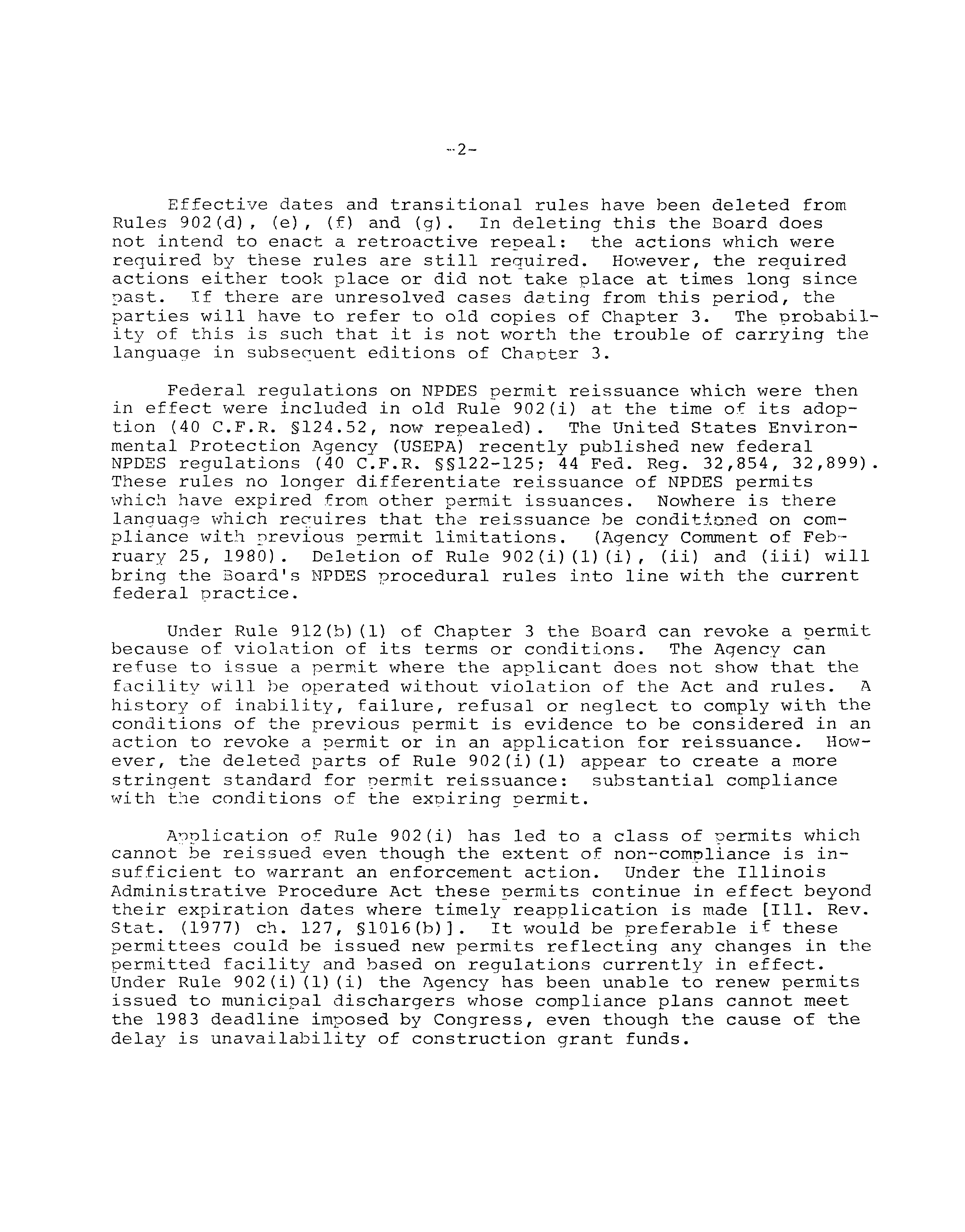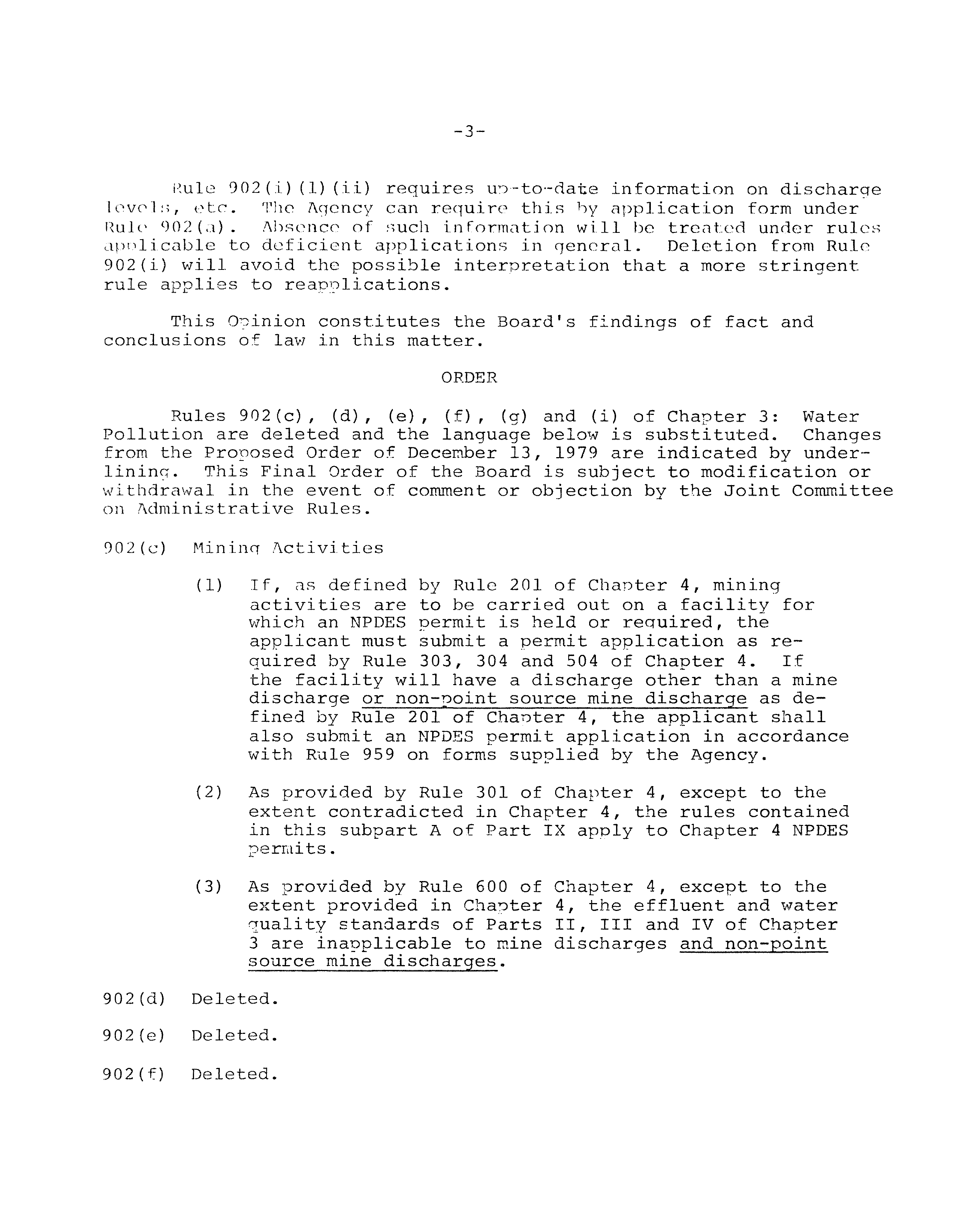ILLINOIS POLLUTION
CONTROL BOARD
May
15,
1980
IN
THE
T~kATTEROF:
AMENDMENTS
TO
RULE
902
OF
)
P39-13
CHAPTER
3:
WATER
POLl
UTION
OPINION
AND
ORDER
OF
THE
DOARD
(by
Dr.
Satchell):
On
December
13,
1979
the
Board
proposed
amendments
to
Rule
902
of
Chapter
3:
?Jater
Pollution.
The
Proposed
Order
was
published
in
Environmental
Register
No.
207
on
December
24,
1979
and
in
the
Illinois Register on January
11,
1980.
The Board received only one
comment, that of the Environmental Protection Agency
(Agency)
which supported the proposed deletion of Rule 902(i) (1) (i) ~ (ii)
and
(iii)
Rule 902(c) (1)
states the relationship between NPDES permits
required under Chapter
3 and those required under Chapter
4:
Mine
Related Pollution.
If mining activities take place on a facility,
then a Chapter
4 application must be submitted.
If the facility
has a discharge other than
a mine discharge or a non—point source
mine discharge,
a Chapter
3 application must also be submitted if
an NPDES permit is required for the other discharge.
Under the
provisions of Part III of Chapter 4,
a single Chanter 3/Chapter
4
NPDES permit will be issued for the facility.
References to
“non-point source mine discharges”
have been
added to Rule 902(c).
Point and non—point source mine discharges
have been differentiated in the Final Order of this date
in R76~20,
R77—l0.
Rule 902(c) (2)
repeats Rule 301 of Chapter
4.
Rules
901 through
916 of Chapter
3 are generally applicable to Chapter
4 NPDES permits,
except
to the extent contradicted in Chapter
4.
Rule 902(c) (3)
repeats Rule
600 of Chapter
4.
Parts
II, III
and
IV of Chapter
3 are generally inapplicable
to mine discharges
and non—ooint source mine discharges except to the extent provided
in Chapter
4.
Subparts
(2) and
(3)
thus state opposite rules
of
incorporation:
Chapter
3 procedural rules are generally applicable
to Chapter
4 oermits, but Chapter
3 effluent and water quality
standards are not generally applicable.
The relationship between
Chapter
3 and Chapter
4 is more fully discussed
in the Board’s Pro-
posed O.inion of December 13,
1979
(R76—20 and R77—lO).
Effective dates and transitional rules have been deleted from
Rules
902(d)
(e)
,
(f)
and
(g)
.
In deleting this
the Board does
not intend to enact a retroactive repeal:
the actions which were
required by these rules are still required.
However, the required
actions either took place or did not take place at times long since
~ast.
If there are unresolved cases dating from this period,
the
parties will have to refer to old copies of Chapter
3.
The probabil-
ity of this
is such that it
is not worth the trouble of carrying the
language
in subseouent editions of Chanter
3.
Federal regulations
on NPDES permit reissuance which were then
in effect were included in old Rule 902(1)
at the time of its adop-
tion
(40 C.F.R.
§124.52, now repealed).
The United States Environ-
mental Protection Agency
(USEPA)
recently published new federal
NPDES regulations
(40 C.F.R. §~l22—l25; 44 Fed.
Reg.
32,854,
32,899).
These rules no longer differentiate reissuance of NPDES permits
which have expired from other permit issuances.
Nowhere is there
language which reeuires that the reissuance he conditioned on com-
pliance wIth nrevious permit limitations.
(Agency Comment of Feb~-
ruary 25,
1980).
Deletion of Rule 902(i) (1) (1),
(ii)
and
(iii)
will
bring the Board’s NPDES procedural
rules into line with the current
federal practice.
Under Rule 912(h) (1)
of Chapter
3 the Board can revoke a permit
because of violation of its terms or conditions.
The Agency can
refuse to issue
a permit where the applicant does not show that the
facility will be operated without violation of the Act and rules.
A
history of inability,
failure, refusal or neglect to comply with the
conditions of the previous permit
is evidence to he considered in an
action to revoke a permit or in an application for reissuance.
How-
ever,
the deleted parts of Rule 902(1) (1)
appear to create a more
stringent standard for nermit reissuance:
substantial compliance
with the conditions of the expiring permit.
Application of Rule 902(i)
has led to
a class of permits which
cannot he reissued even though the extent of non—compliance
is in-
sufficient to warrant an enforcement action.
Under the Illinois
Administrative Procedure Act these permits continue
in effect beyond
their expiration dates where timely reapplication
is made
Ill.
Rev.
Stat.
(1977)
ch.
127,
Sl016(h).
It would be preferable
If these
permittees could he issued new permits reflecting any changes
in the
permitted facility and based
on regulations currently in effect.
Under Rule 902(i) (1) (i)
the Agency has been unable to renew permits
issued to municipal dischargers whose compliance plans cannot meet
the 1983 deadline imposed by Congress,
even though the cause of the
delay is unavailability of construction grant funds.
—3—
~u1e 902(i)(l)(ii)
requires un~-to’-dateinformation on discharge
toveh;,
etc.
The
Agency can require
this
by application form under
e
902
(
~i)
.
Absence of such
I n formation wi 11 be treated
under rules
apnli
cable
to
deficient
applications
in
general.
Deletion
from
Rule
902(i) will
avoid the possible interpretation that a more stringent
rule
applies to reapolications.
This Oninion constitutes
the Board’s findings of fact and
conclusions
of law
in this matter.
ORDER
Rules
902(c),
(d),
(e),
(f),
(g)
and
(i)
of Chapter 3:
Water
Pollution are deleted and the language below
is substituted.
Changes
from the Prooosed Order of December 13,
1979 are indicated by under-
lininc.
This Final Order of the Board is subject to modification or
withdrawal
in the event of comment or objection by the Joint Committee
on
.Adniinistrative
Rules.
902(c)
Mining
Activities
(1)
If,
as defined by Rule 201 of Chanter
4, mining
activities are to he carried out on a facility for
which an NPDES permit is held or required, the
applicant must submit
a permit application
as re-
quired by Rule
303,
304 and 504 of Chapter
4.
If
the facility will have a discharge other than a mine
discharge
or non—~ointsource mine discharge
as de-
fined by Rule 201 of Chanter
4,
the applicant shall
also submit an NPDES permit application
in accordance
with
Rule 959 on forms supplied by the Agency.
(2)
As provided by Rule 301 of Chapter
4,
except to the
extent contradicted in Chapter
4, the rules contained
in this
subpart A of Part IX apply to Chapter
4 NPDES
permits.
(3)
As provided by Rule 600 of Chapter
4,
except to the
extent provided in Chaflter
4,
the effluent and water
quality standards
of Parts II, III and IV of Chapter
3 are inaoplicable to mine discharges and non—point
source mine discharges.
902(d)
Deleted.
902(e)
Deleted.
902(f)
Deleted.
--4--
902(q)
New Discharges
Any person whose discharge will begin after the effective
date of this Subpart A or any person having an NPDES Permit
issued by the U.S. Environmental Protection Agency for an
existing discharge which will substantially change in
nature,
or increase in volume or frequency must apply for
an NPDES Permit either:
(1)
~o later than 180
days
in
advance
of
the
date
on
which
such
NPDES
Permit
will
be required;
or
(2)
In
sufficient
time
prior
to
the
anticipated
commence-
inent of the discharge
to insure compliance with the
requirements
of Section
306 of the FWPCA, or with any
applicable zoning or siting requirements established
pursuant to Section 208(b) (2) (C)
of the FWPCA, and
any other applicable water quality standards and
applicable effluent standards and limitations.
902(i)
Renewal
(1)
Any permittee who wishes to continue to discharge
after the expiration date of his NPDES Permit shall
apply
for reissuance of the permit not less than 180
days prior to the expiration date of the permit.
(2)
The Agency shall circulate public notice and provide
opportunity for nubile hearing,
as provided for
in
this Suhoart A,
in the same manner as
for a new
nermit application.
IT
IS
SO
ORDERED.
I,
Christan
L.
Moffett,
Clerk
of
the
Illinois
Pollution
Control
Board,
hereby
certify
the
above
Opinion
and
Order
wer~
adopted
on
the
~
day
of
___________,
1980
by
a
vote
of
~-O
Christan L.
Moff’e,~.
,
Clerk
Illinois Po11utidn’~Contro1Board




